The AMD 2nd Gen Ryzen Deep Dive: The 2700X, 2700, 2600X, and 2600 Tested
by Ian Cutress on April 19, 2018 9:00 AM ESTCPU Encoding Tests
One of the interesting elements on modern processors is encoding performance. This includes encryption/decryption, as well as video transcoding from one video format to another. In the encrypt/decrypt scenario, this remains pertinent to on-the-fly encryption of sensitive data - a process by which more modern devices are leaning to for software security. Video transcoding as a tool to adjust the quality, file size and resolution of a video file has boomed in recent years, such as providing the optimum video for devices before consumption, or for game streamers who are wanting to upload the output from their video camera in real-time. As we move into live 3D video, this task will only get more strenuous, and it turns out that the performance of certain algorithms is a function of the input/output of the content.
All of our benchmark results can also be found in our benchmark engine, Bench.
7-Zip 9.2: link
One of the freeware compression tools that offers good scaling performance between processors is 7-Zip. It runs under an open-source licence, is fast, and easy to use tool for power users. We run the benchmark mode via the command line for four loops and take the output score.
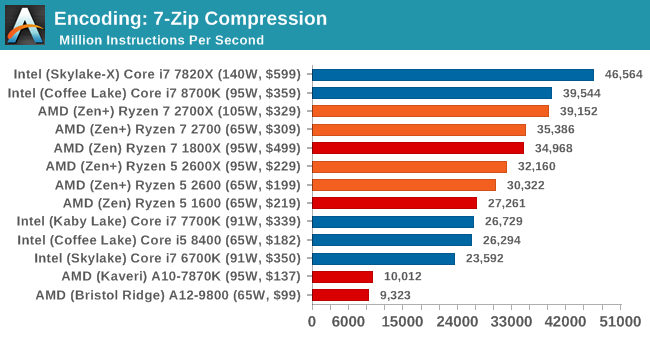
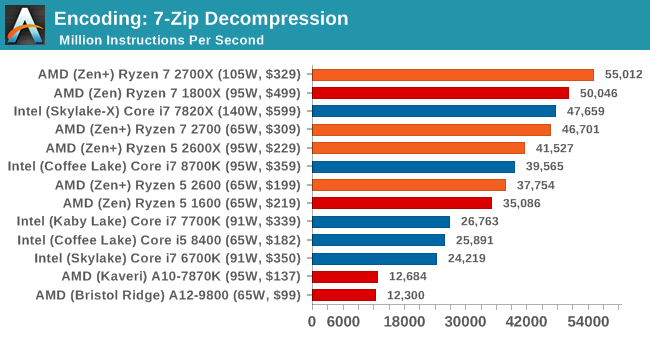
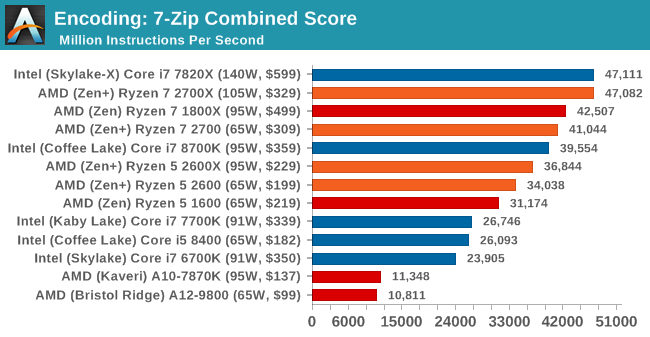
WinRAR 5.40: link
For the 2017 test suite, we move to the latest version of WinRAR in our compression test. WinRAR in some quarters is more user friendly that 7-Zip, hence its inclusion. Rather than use a benchmark mode as we did with 7-Zip, here we take a set of files representative of a generic stack (33 video files in 1.37 GB, 2834 smaller website files in 370 folders in 150 MB) of compressible and incompressible formats. The results shown are the time taken to encode the file. Due to DRAM caching, we run the test 10 times and take the average of the last five runs when the benchmark is in a steady state.
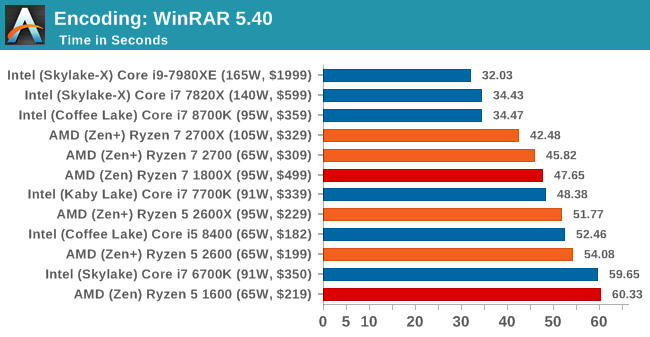
WinRAR requires a good memory base, so we see the quad-channel processors heading up the pack. The high IPC of the Core i7-8700K also does well.
AES Encoding
Algorithms using AES coding have spread far and wide as a ubiquitous tool for encryption. Again, this is another CPU limited test, and modern CPUs have special AES pathways to accelerate their performance. We often see scaling in both frequency and cores with this benchmark. We use the latest version of TrueCrypt and run its benchmark mode over 1GB of in-DRAM data. Results shown are the GB/s average of encryption and decryption.
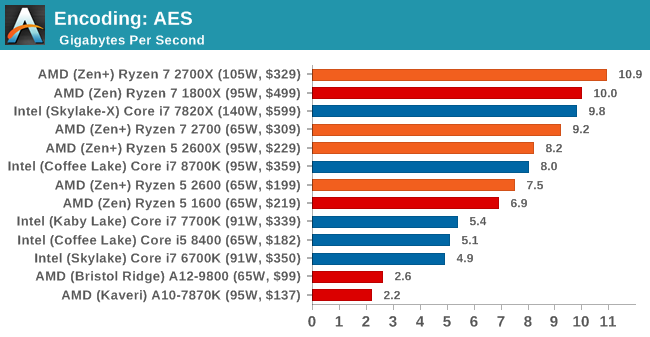
HandBrake v1.0.2 H264 and HEVC: link
As mentioned above, video transcoding (both encode and decode) is a hot topic in performance metrics as more and more content is being created. First consideration is the standard in which the video is encoded, which can be lossless or lossy, trade performance for file-size, trade quality for file-size, or all of the above can increase encoding rates to help accelerate decoding rates. Alongside Google's favorite codec, VP9, there are two others that are taking hold: H264, the older codec, is practically everywhere and is designed to be optimized for 1080p video, and HEVC (or H265) that is aimed to provide the same quality as H264 but at a lower file-size (or better quality for the same size). HEVC is important as 4K is streamed over the air, meaning less bits need to be transferred for the same quality content.
Handbrake is a favored tool for transcoding, and so our test regime takes care of three areas.
Low Quality/Resolution H264: Here we transcode a 640x266 H264 rip of a 2 hour film, and change the encoding from Main profile to High profile, using the very-fast preset.
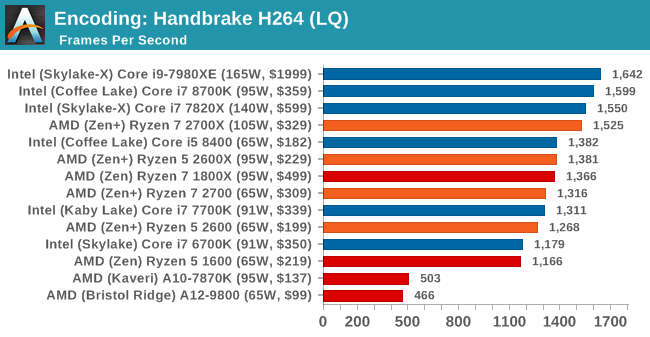
High Quality/Resolution H264: A similar test, but this time we take a ten-minute double 4K (3840x4320) file running at 60 Hz and transcode from Main to High, using the very-fast preset.
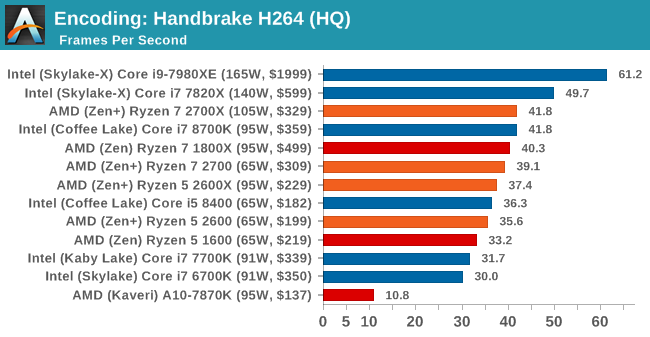
HEVC Test: Using the same video in HQ, we change the resolution and codec of the original video from 4K60 in H264 into 4K60 HEVC.
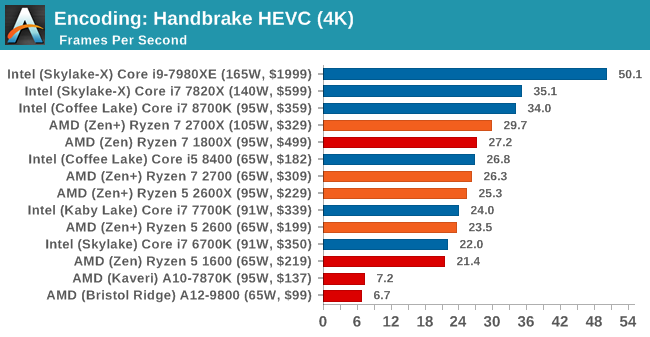
For HandBrake video encoding of large frames, there is a bump with the new Ryzen-2000 series processors over the previous generation, however there is still a gap up to the Core i7-8700K. The Core i5-8400 puts in a good showing here, above all but the best Ryzen parts.










545 Comments
View All Comments
mapesdhs - Saturday, April 21, 2018 - link
Not an argument.0ldman79 - Thursday, April 19, 2018 - link
In the real world we have to choose depending on features and performance while constrained by a budget.For intellectual discussion and better understanding of the chips and architecture we need direct comparison.
Both arguments work for entirely different reasons. I rarely have the budget for high end Intel. I'm also into overclocking and run VM, so the only way I hit both of those is to run AMD.
I've also got a few apps that really take advantage of AVX2 and AVX512, which even the Ryzen gets monstrously stomped by Intel.
If you judge by a single metric you're missing the big picture. Everything is a compromise.
Ninjawithagun - Thursday, April 19, 2018 - link
Actually, the comparison between the 2600X (not 2700X) and the 8700K is based upon multiple metrics, not just one.Ninjawithagun - Thursday, April 19, 2018 - link
Once again incorrect. Cost vs. Cost is only one of many factors to consider, but is not a main one, especially if the competition has a processor of equal quality for much less cost. Comparing an Intel 6 core/12 thread CPU to an AMD 8 cores/16 thread CPU makes absolutely no sense if you are measuring cost vs. performance. Your argument makes no sense, sorry.LurkingSince97 - Thursday, April 19, 2018 - link
Once again incorrect. Cost vs Cost is the primary factor for a buyer on a budget. It is the main one.Case in point, if I can get a 2600X for the same price as a much slower Intel chip, it is obviously better.
Comparing a $300+ chip to a $200+ one makes absolurely no sense if you are measuring cost vs. performance. Your argument makes no sense, sorry.
See what I did there? Your argument (and the one above) are BS. You are either a troll, or have a serious intellectual disability. Price, performance, and implementation details (core count) are all independent dimensions and you can look at any of them from the perspective of the other.
Price just happens to be the constraint that most shoppers have to start with. They can vary the other parameters, within the price constraint.
A others with more money might instead lock in a performance / feature set requirement and _then_ consider price, but that is the minority.
fallaha56 - Thursday, April 19, 2018 - link
Well saidI suggested the chap apply his own facile argument and compare threadripper to the 8700k...
gglaw - Saturday, April 21, 2018 - link
They compared multiple "qualities" of processors between two Ryzen generations and CL. If you want to look at them core for core, is it that hard to shift your eyes 3 lines up to see the next line of results? Do you want them to exclude the 2700X since there isn't a consumer level CL to match it?LurkingSince97 - Thursday, April 19, 2018 - link
Price and absolute performance are paramount. Comparing at raw architecture levels is interesting but less important.In the real world, there are consumers who are not that price sensitive, in which case they only care about a top end part that is within their range. They don't care if it is 10 core/ 20 thread vs 8 core /16 thread or 6 core 12 thread -- they care about the raw performance for what they need, and are usually willing to go up in cost somewhat for that performance (including mobo/ram costs). This is the sort of consumer I am today.
There are then others who are price sensitive and have a budget. For these people the price tag is paramount. The flaw with this review (and most in general) is that it does not include mobo / ram / etc costs and often just looks at the CPU price alone. For someone budget conscious they have to carefully consider whether saving $100 on a CPU or $50 on a mobo can give them the ability to spend that on say, a better GPU or nicer monitor. For those, comparing products by price point is way more important than comparing them by architecture. This is the sort of consumer I was when I was a poor college student / gamer that had to part together my own systems with very limited budgets.
As a tech geek, I am always interested in the core-for-core or clock-for-clock comparison, but in the real world for purchasing decisions it doesn't matter if a Ryzen with 6 cores/12 threads at 3Ghz is faster or slower than an Intel chip with 6 cores/12 threads at 3Ghz. In the end, they can have different core counts, threads, and Ghz -- all that matters is the actual performance.
Targon - Monday, April 23, 2018 - link
In the case of Ryzen, you can use the same motherboard from the first generation to the second, or the third, or the fourth(in 2020). You may not get all the features, but they will work, and CPU cost is the only thing needed since you already have the other components.Actual performance is the correct focus, but game performance isn't the same as rendering performance, or for those who tend to have 8+ programs open as a part of their normal work environment. Just saying "performance" ignores that what you use your computer for isn't necessarily the same as what other people use their computer(s) for.
Targon - Monday, April 23, 2018 - link
That is why they use different game benchmarks. Some do make use of more cores/threads, and others make use of other design differences between different products. Price vs. performance is a very valid comparison based on workload, not just games, but in other tasks. You could have higher core count processors with lower clock speeds at the same price point, even when looking at Intel. 6-core lower speed, or 4-core higher speed at the same price point. Which does better for the tasks you personally care about? Intel 8700K vs. AMD 2700X is the fair comparison, while you will compare the 2600 to the i5, again, due to the price point. When you look at the performance results, you SHOULD in theory, see that these chips match up in terms of performance for the price, though AMD tends to have an advantage these days in multi-threaded tasks, while Intel tends to do better in lightly threaded workloads due to clock speeds.